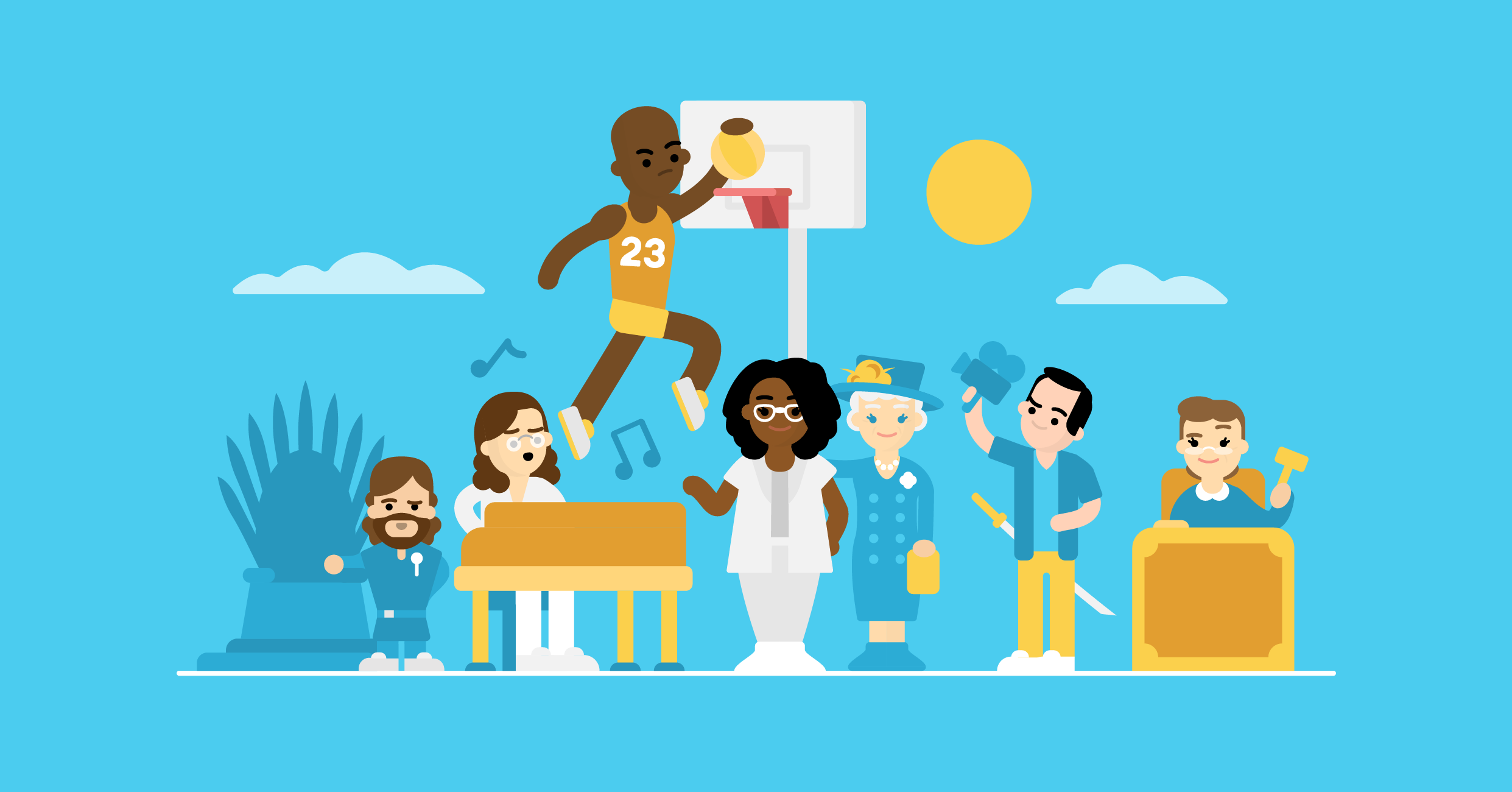
Extracurricular activities come with a number of benefits for high school and college students alike.
As a high school student, extracurricular activities can enrich your college application and help you stand out from other applicants.
As a university student, on the other hand, extracurricular activities can help you gain real-life skills and make your resume more impressive, helping you land your first job after college.
In this article we’ll cover everything there is to know about extracurricular activities that can help you better shape your future, including:
- What Are Extracurricular Activities?
- 95+ Extracurricular Activities You Can Try
- How to List Extracurricular Activities on a Resume
- Benefits of Extracurricular Activities
Let’s dive in!
What Are Extracurricular Activities?
Extracurricular activities refer to any kind of activity not covered by a school, college, or university curriculum. They are usually voluntary, social, or philanthropic activities that involve other participants of the same age.
Most students take up extracurricular activities to engage in a particular hobby (e.g. drama club if you’re into theater), to develop certain skills (e.g. public speaking club if you want to become more charismatic), or to gain specific experiences (e.g. marketing club to learn how to work in a team).
However, extracurricular activities are much more than just hobbies. Studies have shown they are particularly important for teenagers and young adults because they help:
- Develop a stronger mind. Extracurricular activities can help teens and young adults develop their brains in different ways than an academic curriculum. A student who does sports, for example, will learn resilience in the face of intense physical and mental difficulty.
- Learn professional skills. Different extracurricular activities can train students in different professional skills (e.g. student government can teach you leadership and delegation, debate club can teach you public speaking, and so on).
- Create a wider social circle. Extracurricular activities allow youths to meet other people their age that share similar interests.
- Learn time management. Balancing schoolwork with extracurricular activities can help students manage their time better, which is a highly-valuable skill later in life.
- Explore new interests. Extracurricular activities are how teenagers and young adults can identify their non-academic interests and explore other potential career paths.
That said, picking the right extracurricular activity can be a bit challenging. There are hundreds of extracurricular activities out there and, chances are, you don’t have the time or energy to try them all out and see what sticks.
To help you out, we’ve covered the most popular extracurricular activities below, organized into categories to make it easier to find the right choice for you:
13 Types of Extracurricular Activities
#1. Academic
Academic activities are based on an academic subject and include clubs and competitive teams.
Academic clubs discuss and practice a specific subject, whereas competitive teams usually participate in competitions on all levels, from local to national.
Clubs
- Architecture Club
- Astronomy Club
- Biology Club
- Chemistry Club
- Economics Club
- Electronics Club
- Engineering Club
- English Club
- Distributive Education Clubs of America
- History Club
- Life Sciences Club
- Literature Club
- Literary Magazine Club
- Math Club
- National Honor Society
- Peer Tutoring
- Poetry Club
- Physics Club
- Psychology Club
- Quill and Scroll
- Robotics Club
- Science National Honors Society
- Trivia and Quiz Clubs
- Web design/coding club
- Writing Club
Competitive Teams
- Academic Decathlon
- Academic Triathlon
- American Mathematics Competitions
- American Regions Math League
- Caribou Mathematics Competition
- Chemistry Olympiad
- Clean Tech Competition
- Creative Communication Poetry Contest
- EconChallenge
- FIRST Robotics Competition
- High School Innovation Challenge
- Intel International Science and Engineering Fair
- Kids Philosophy Slam
- Math League
- National Academic Quiz Tournament
- National French Contest
- National History Bee
- National Spelling Bee
- Odyssey of the Mind
- Poetry Out Loud
- Questions Unlimited
- Quiz Bowl
- Science Bowl
- Science Olympiad
#2. Art
You can never know your artistic potential unless you practice your art skills extensively and get feedback from other people. These extracurricular activities let you do just that:
- Animation
- Anime/Manga Club
- Art Club
- Drawing
- Cartooning
- Drama Club
- Fashion design
- Graphic Design
- Jewelry Making
- Photography
- Sculpture
- Sewing
- High School Theater Program
- Community Theater Program
- Video Game Development Club
- Woodworking
#3. Cultural and Language
Cultural and language-focused extracurricular activities are some of the best ways to expand your horizon and hone your communication skills.
On one hand, these types of activities can help you get a feel for different cultures and people. On the other, they are a great way to learn foreign languages, a skill that can definitely come in handy both in your personal and professional life.
These are some of the most popular cultural and language-related extracurricular activities:
- African American Student Alliances/Clubs
- American Sign Language Club
- Chinese Club
- French Club
- German Club
- International Food Club
- Latin Club
- Pacific Islanders Club
- Russian Club
- South Asian Student Society
- Spanish Club
#4. Community
These extracurricular activities allow you to get involved with your community.
You can, for example, help a non-government organization clean your neighborhood, bring food to homeless people, organize town festivals, and more.
Such extracurricular activities help you meet people in your community, have a positive impact on your town, and can even improve your college application.
If you think community-focused activities are something you’d enjoy, give one of these a try:
- 4-H
- Community Festivals
- Do Something
- Habitat for Humanity
- Key Club
- Kids Helping Kids
- Leo Club
- Mountaineers Club
- Sisters on the Runway
#5. Government and Leadership
Government and leadership activities can be essential in honing your interpersonal and problem-solving skills, as well as teaching you what it takes to make a difference through policy.
If you’re considering a career in politics or are really passionate about the field, then you should definitely consider one of the following extracurricular activities:
- Community Youth Board
- Student Council
- Student Government
- Community Government
- Peer Leadership Group
#6. Media
Do you dream of becoming a media celebrity? Or, maybe, you’ve always wanted to become an award-winning journalist…
Whichever the case might be, there are a ton of extracurricular activities you can do to start learning about the media industry, including:
- School or local magazine/journal
- School or local newspaper
- School or local radio station
- School or local television channel
- School or local website
- Yearbook Committee
#7. Music & Performance Art
Is performing something you've always been passionate about?
Then these activities are just the right ones for you. They can help you explore the world of performative art, develop your skills, and get a glimpse of what a future career in the field could look like.
Here are only some of the many options:
- School Chorus/Choir
- Community Chorus/Choir
- Church Chorus/Choir
- Chamber Music Group
- Concert Band
- Ensembles
- Singing Lessons
- Marching Band
- Jazz Band
- Orchestra
- Solo music
- Your own band
- Comedy Club
- Choreography
- Classic Film Club
- Dance
- Film Production Club
- International Thespian Society
- Miming
- Puppetry
- Slam Poetry Club
- High School Theater Group
- Community Theater Group
#8. Social Activism
Social activism can touch upon the many issues the world is facing today, like animal rights, women’s rights, pollution, and many more.
Check your school and community for any of these clubs and organizations that support different social causes:
- Amnesty International
- Animal Rights Club
- Breast Cancer Awareness
- Cancer Foundation
- Environmental Club
- Fair Trade Club
- Gay-Straight Alliance
- Girls Lean International
- NOW—National Organization for Women
- SADD—Students Against Destructive Decisions
#9. Special Interest
Some extracurricular activities don’t fall under any particular category. If you have a special interest in something that you can’t find a local group or school club for, you can simply create one or join a national group. This way, you can meet other members online and attend annual meetups.
Here are some special interest extracurricular activities you can explore:
- Boy Scouts
- Chess Club
- Equestrian Club
- Entrepreneurship Club
- Future Business Leaders of America (FBLA)
- Girl Scouts
- Horticulture Club
- Model Railroads
- Quilt Making
#10. Speech and Political Interest
Do you want to learn more about the intricate ways politics interact with our lives? Or, maybe, you want to eventually become a politician and a skilled orator yourself.
Well, politics can definitely be practiced, and the following extracurricular activities will give you the chance to do just that:
- Debate Club
- Euro Challenge
- Foreign Affairs Club
- Forensics Team
- High School Democrats of America
- High School Fed Challenge
- Junior Statesmen of America
- Mock Trial Club
- Model Congress Club
- Model United Nations
- National Speech and Debate Association
- Speech Club
- Teenage Republicans
- Young Democrats of America
#11. Sports
Nothing can help you hone your determination, work ethic, and team spirit like organized sports activities can.
There are countless to choose from, but some of the most popular options are:
- Baseball and softball
- Basketball
- Bodybuilding
- Cheerleading
- Climbing Club
- Cycling
- Dance Team
- Fencing
- Football
- Golf
- Gymnastics
- Hiking Club
- Hockey
- Intramural Sports
- Lacrosse
- Martial Arts
- Ping Pong Club
- Quidditch Clubs
- Skate Board Club
- Skiing
- Soccer
- Swimming
- Tennis
- Track & Field
- Ultimate Frisbee Club
- Volleyball
- Water Polo
- Yoga Club
#12. Technology
Being skilled in tech comes with plenty of advantages.
If you decide to follow a career in tech, you'll be hired for some of the highest-paying jobs in the market. Even if you don't, having tech skills can come in handy in your personal life or if you ever decide to go for a career change.
Start developing your skills early on by choosing among the following activities (or anything else that might speak to you on a personal level):
- Blogging
- Personal Web Site
- Social Media
- YouTube Channel
#13. Volunteering Activities
If you’re looking to make a difference for a cause you’re passionate about, consider volunteering. Not only can volunteering be good for your health, but it also looks great on your resume and college applications:
- Adopt-a-Highway
- Animal Rescue
- Best Buddies International
- Church Outreach
- Hospital volunteer
- International volunteer program
- Mentoring
- Red Cross Club
- Tutoring
- UNICEF High School Clubs
- Volunteer Fire Department
- Work with a local charity
- Work with a local soup kitchen
💡
Quick Tip
If you see an extracurricular activity you like that your school doesn’t offer, you can try joining a community or an online group to explore your interest further. Alternatively, you can try starting a club yourself - not only it will allow you to do what you’re passionate about, but it will also develop your leadership and initiative skills.
Are Extracurricular Activities Good For My Resume?
You’ve probably heard that “extracurricular activities are good for your resume.”
If you're wondering how much truth there is in that statement, the answer is a lot!
Although not as important as your work experience or education history, extracurricular activities can be excellent additions to your resume.
As a high school or university student or graduate, you probably have next to no work experience. Hence, you might have a big empty spot on your resume where the work experience section should be.
Extracurricular activities are a great way to fill in that gap!
They help by:
- Showcasing specific skills or experiences. If you’re looking for a job in media, for example, having worked for your school's online newspaper will definitely help you stand out.
- Proving that you have experience working in a team. Group extracurricular activities often mirror a typical office environment. You work with a team, brainstorm ideas, organize events, and so on. Hence, by including extracurricular activities in your resume, you’re proving to a potential employer that you’re no stranger to teamwork.
So, make sure to include your extracurricular activities on your resume!
Here’s an example of how you could potentially include your volunteering experiences on your college resume:

💡
Quick Tip
If more than five years have passed since you graduated, you should not include extracurricular activities on your resume even if they’re super impressive.
Your work experience is a much better proof of your skills as a professional than whatever you did back during college or high school.
6 Best Extracurricular Activities for Your Resume
Some extracurricular activities are more valuable for your resume than others.
This is simply because some activities teach you useful work skills (teamwork, empathy, and interpersonal skills), while others are simply just a hobby.
Here’s a list of extracurricular activities that are more likely to have an impact on your career:
- Sports. Doing sports can demonstrate a bunch of soft skills, including dedication, teamwork, and work ethic.
- Government and leadership. Extracurricular activities like the student council, student government, or Community Youth Board can prove your leadership, organizational, and decision-making skills.
- Cultural and language. Foreign languages are highly valued by recruiters and showing that you master one and that you’re culture-oriented can effectively set you apart from other candidates. Specifically, these types of extracurricular activities testify to your determination, hard work, and cultural awareness.
- Volunteering activities. Volunteering activities are the extracurriculars that are closest to an actual job (without the pay, that is). On top of proving you can be passionate about a cause to devote your time to it, volunteer work typically comes with responsibilities and deadlines that can show recruiters you’ll be a reliable employee.
- Academic. Academic activities such as peer tutoring or participation in different clubs and teams can attest to your communication skills, specific expertise in a particular area, and creative thinking skills, among other things.
- Political interest and social activism. These types of activities, from fundraising to supporting different social causes locally or nationally, can demonstrate a variety of valuable skills (project management skills, leadership, analytical skills, etc.).
How to List Extracurricular Activities on a Resume
By now, you know about all the cases when it can be helpful to list extracurricular activities on your resume and which are the ones recruiters prefer.
But how do you do it the right way? You have 3 options:
#1. List extracurricular activities in your professional experience section
If your extracurricular activity had responsibilities and time commitments similar to a part-time or full-time job or if it has helped you acquire skills that are directly related to the position you are applying for, then you can list them under your professional experience.
Say, for example, that you’re applying for your first job as a journalist and you were an editor for your college newspaper for over two years.
Chances are, most of your responsibilities and achievements engaging in this extracurricular activity are directly related to your future position (spell-checking and looking for grammatical errors, verifying facts, rewriting articles, brainstorming, etc.).
In such cases, listing your activities under professional experience is totally acceptable and can work in your favor by highlighting your work-related skills.
Here’s an example of what that would look like on a resume:
Example:
Professional Experience- Editor in Chief of Penn State’s independent newspaper “Daily Collegian” for over two years where I led a team of 13 journalists.
- Extensively handled duties like spell and grammar checks, fact-checking, editing, etc.
- Won Pacemaker Award in 2018 for the best online college newspaper.
#2. List extracurricular activities in your education section
Your second option is to list your extracurricular activities under your education section.
If you participated in many activities throughout your education, filter them based on how relevant they are to your major and to the position you’re applying for.
On top of that, take into account what kind of skills the activities effectively highlight. If, for example, you’re applying for a job that requires rigorous work ethic and determination, prioritize listing your sports activities instead of your, say, social activism ones.
Here’s how you should list your extracurriculars in your education section:
Example:
EducationUniversity of PennsylvaniaMaster of Education in Counseling and Mental Health Services2016 - 2018- Career mentor for the university’s Career Centre
#3. List extracurricular activities as a separate resume section
Last but not least, you can list your extracurricular activities in a separate resume section. Specifically, you should do so when said activities don’t relate much to your education or your professional orientation, but can add value to your resume.
Depending on the nature of your activities, you can title the section in a way that makes sense—for example, “Volunteering” if you did a lot of volunteer work, “Projects” if your extracurricular activities consisted of technical activities, “Languages” if you worked hard on learning a foreign language, etc.
If your extracurricular activities come with some noteworthy accomplishments, you can even list them under “Achievements” - just make sure you can back your claims with some hard facts to convince recruiters.
Here’s a practical example of what that would look like in a resume:
Example:
Achievements- Tutored over 70 students in Statistics and Algebra as a teaching assistant and student counselor, with all of them attaining more than average grades in exams.
- Helped organize university fundraisers aimed to help science-oriented students from low-income backgrounds attend college. More than half of the fundraisers exceeded donation amounts by 10%-13%.
Benefits of Extracurricular Activities
Different types of extracurricular activities bring different sets of advantages. Sports can develop your teamwork spirit, academic activities can help you grow your expertise in a particular field, and arts can positively influence your communication and creative thinking skills.
Despite their specifics attributes, all extracurricular activities are shown to have some common benefits for students, including:
- Cultivating self-esteem and confidence.
- Developing a strong sense of work ethic.
- Encouraging superior academic and athletic performance.
- Improving a high school student’s college application portfolio.
- Offering children and youths the opportunity to develop friendships outside of the classroom.
- Helping children and youth develop emotional intelligence which they also bring inside the classroom.
FAQ on Extracurricular Activities
Do you still have some questions about extracurricular activities? We try to answer them below:
Key Takeaways
And that’s a wrap! By now, you have an extensive list of extracurricular activities to choose from, as well as all the knowledge to use to your advantage when applying for jobs and universities.
Before you go, here are the main points we covered in this guide:
- Extracurricular activities refer to any kind of activity not covered by a school, college, or university curriculum. They are usually voluntary, social, or philanthropic activities that involve other participants of the same age.
- Extracurricular activities can be great additions to your resume, especially if you are a college student or recent graduate without paid work experience, or if they are directly related to the field or position you are applying for.
- The best extracurricular activities to add to your resume fall under these categories: academic, sports, volunteering, languages, cultural, and political activism.
- You can list extracurricular activities in your resume by adding them under your professional experience, in your education section, or as a separate resume section.



